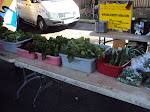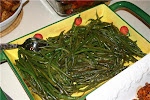Food and Health
A compound in citrus fruits may reduce your stroke risk, according to research reported in Stroke: Journal of the American Heart Association. Eating higher amounts of a compound in citrus fruits, especially oranges and grapefruit, may lower ischemic stroke risk. Women who ate high amounts of the compound had a 19 percent lower risk of ischemic stroke than women who consumed the least amount. http://www.sciencedaily.com/releases/2012/02/120223182638.htm
Worldwide, inadequate vitamin D is common, and deficiencies can be found on all continents, in all ethnic groups, and across all ages. Why are these widespread low levels of vitamin D such a great concern? Because research conducted over the past decade suggests that vitamin D plays a much broader disease-fighting role than once thought. http://www.hsph.harvard.edu/nutritionsource/what-should-you-eat/vitamin-d/
Food Safety
Depending on who you ask, the U.S. Department of Agriculture's Microbiological Data Program (MDP), which randomly tests produce for dangerous pathogens, is either an unnecessary, slow-moving program housed in the wrong agency, or a critical public health initiative that fills a big, alarming gap in domestic produce testing. The debate over MDP, which falls under the Agriculture Marketing Service, intensified last week with the news that the Obama administration's budget eliminates the $5 million program in Fiscal Year 2013. http://www.foodsafetynews.com/2012/02/the-fight-over-the-microbiological-data-program/
Two new cases, both from Michigan, have been confirmed in the multistate outbreak of E. coli O26 linked to raw clover sprouts served at Jimmy John's restaurants in six states, the Centers for Disease Control and Prevention reported Friday. That brings the outbreak total to 14. All of those sickened are female. Two have been hospitalized. http://www.foodsafetynews.com/2012/02/outbreak-linked-to-raw-sprouts-grows-to-14-cases/
Food Assistance
Dozens of students at a Texas middle school staged a boycott of the cafeteria lunch menu last week in protest of repetitive offerings, the Victoria Advocate reported. Inspired by a recent history lesson in which they learned the word "boycott," around 30 seventh graders at Austwell-Tivoli Junior High School near Texas' Gulf Coast decided to bring their lunches from home Tuesday through Friday. http://www.huffingtonpost.com/2012/02/21/students-boycott-school-lunches-texas_n_1291411.html
Low-income county residents who take advantage of CalFresh, or the program formerly known as food stamps, is finally on the rise after years of low participation. Still, a new report by California Food Policy Advocates notes that barely more than half of Californians eligible for food stamps sign up. And some 81,000 Sacramentans who qualify still haven’t registered. In fact, a little more than half of all eligible Californians participate in CalFresh. This means the program, which is federally funded and county administered, fails to reach 3.5 million state residents for nutritional assistance. http://www.newsreview.com/sacramento/more-sacramentans-using-californias-food-stamp/content?oid=5240896
Schools are increasingly dishing up dinner to students — something advocates for the poor praise but conservatives question. The Healthy, Hunger-Free Kids Act, signed into law by President Barack Obama in December 2010, provides federal funds for the after-school dinner program in areas where at least half the students qualify for free or reduced price lunches. Before the change, the program was limited to 13 states and the District of Columbia. http://www.abc4.com/content/news/national/story/More-public-schools-dish-up-three-meals-a-day/3kXC6e5-l06RwfxDAHFXQg.cspx
Subscribe to:
Post Comments (Atom)

























































































No comments:
Post a Comment